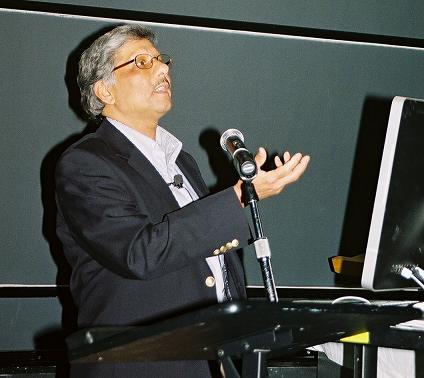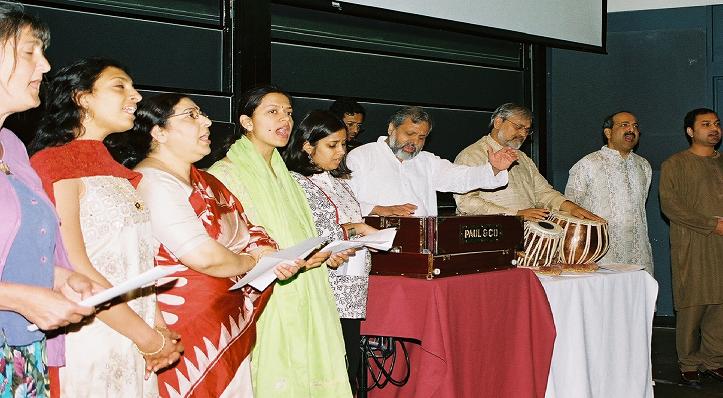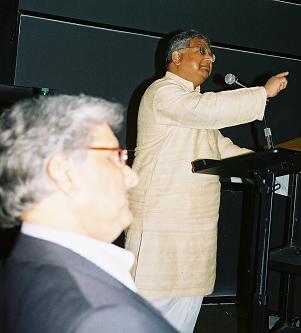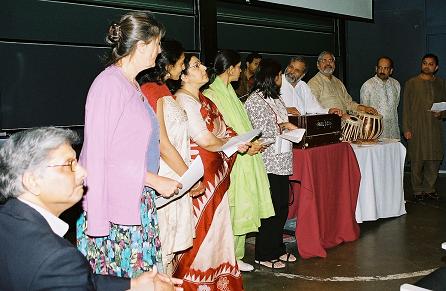Contribute
| The Prosody Of The Rg Veda And The Recitation Of The Mantras |
C. Gopinath
04/29/2010
On April 11, 2010, Dr. Satya Prakash Saraswat, Bentley University, spoke on the prosodic variations in the composition of the Vedas and their effects on the style and recitation of mantras in the Science Center at Harvard University, Cambridge.
The speaker began by reminding the audience that there were 21 different ways in which, according to traditional texts, the mantras can be recited. Thus, any particular style would not be the ‘correct’ way and he suggested to explore and appreciate the recitation with diction. Dr. Saraswat also explained that although he was trained as an engineer and a scientist (he is a professor of information systems), his approach to the subject was not to measure or verify, but to take a phenomenological understanding of how the hymns glorify the cosmic order.
Dr. Saraswat explained that six different studies are required to appreciate the Vedas. They are the six vedangas: phonology (shiksha), prosody (chanda), astronomy (jyotisha), etymology (nirukta), ceremonial (kalpa) and grammar (vyakarna).
Focusing on the prosody, he went on to list the seven meters of the Rg Veda, each of which corresponded to a note in the Sama veda (shown in parenthesis): Gayathri (sadja), usnik (risabha), anustubh (gandhara), brhati (madhyama), pankti (panchama), tristubh (daivata) and jagati (nisad). Beginning with 24 syllables, they increase in steps of four syllables each. Dr. Saraswat then took hymns from the Rg Veda as illustration for each meter and provided a rendering of it to demonstrate the syllable structure. He encouraged the audience to join in the rendering so they could experience the pronunciation and its musicality and led them in the chanting of the hymns. The collective recitation was lively.
Dr. Saraswat’s stress was on experiencing the mystical nature of the Rg Veda. He explained how most translations were of the exoteric and microcosmic nature. However, chanting the hymns and contemplating on them allowed one to appreciate their mystical content which took one beyond the limits of rational thought processes. As example, he provided references to hymns that talk about the movement of the sun, or that of flying horses, and said that while one might be befuddled by the literal meaning, the mystical meaning allowed one to contemplate the cosmic order.
Dr. Saraswat’s presentation prompted several questions and comments from the audience. Some members rendered hymns in other metrical and pronunciation formats. There were also questions raised about the counting of the syllables, and comments on various traditions of Rg Vedic study and hymn chanting. Other aspects regarding tonality and time measures were shared by various members of the audience.
The Stotranjali Group, a voice ensemble conceived by Bijoy Misra to explore the interpretive rendering of Sanskrit compositions performed twice. The first song, "Hiranyagarbhahasuktam" from the Rg Veda was led by Preeti Nagar and the second, "Shri Krishna Geetam", a compilation from the Bhagavad Geeta was led by Pradeep Shukla, LearnQuest Academy. The participants were: Preeti Nagar, Deepa Ramachandran, Maria Cusumano, Prakriti Tayalia, Tanu Aggarwal, Dilip Pai, Naresh Parmar, and Uday Tembulkar. They were accompanied on the violin by Ramachandran Balakrishna and on the tabla by Prem Nagar. Their singing was enthusiastically received by the audience.
Dr. Saraswat’s talk was the sixth in the Outreach Lectures of the Harvard Department of Sanskrit and Indian Studies for the academic year 2009-2010. Earlier lectures this year dealt with genetic research in South Asia, the trade routes, archaeology of the Indus Civilization, and the origin and dating of the Vedas. Lectures in the series will resume in November this year.
The next outreach event is the Annual India Poetry Reading which is scheduled on 9 May, 3-5 pm, Hall A, Science Center, Harvard University. This is the 14th annual event and the topic for this year is ‘Indian Society.’ Those who wish to read or recite their own (or any one else's) composition, in any language, are requested to contact Prof. Bijoy Misra, at bmisra@fas.harvard.edu or by phone at 617-864-5121.
You may also access this article through our web-site http://www.lokvani.com/



